-
How Your Teeth Can Affect Your Sleep Quality

How is the quality of your sleep?
Sleep is important to our health in many ways, and a lack of it can diminish our concentration, leave us fatigued, and cause headaches. You may be suffering from broken sleep and not even know it, but your dentist can spot clues of sleep disturbance by just examining your mouth. How are oral health and sleep connected? Read on to learn the links between poor dental health and poor sleep.
The Sleep-Mouth Connection
- Periodontal disease can be exacerbated by poor sleep. That’s because poor sleep leads to inflammation in the body that impacts the health of your gums. By the same token, painful tooth and gum infections can keep you awake, creating a vicious cycle.
- Bruxism, grinding or clenching your teeth, can disrupt your sleep. It can also damage your teeth and lead to problems with your jaw or bite. To reduce bruxism, reduce stress, and create a relaxing bedtime routine.
- Another stress-related sleep disruptor is the presence of canker sores. These can be caused by anxiety and stress, and can make it hard to sleep.
- Insomnia can contribute to dry mouth. When you’re awake in the night, the amount of saliva in your mouth can be reduced. This can lead to dry mouth, which increases the number of bacteria in your mouth and contributes to tooth decay, as well as bad breath. Dry mouth, in turn, can be uncomfortable and cause sleeplessness.
- Sleep apnea starts with trouble breathing. It can cause snoring and interfere with a person’s ability to get quality sleep. It can also lead to temporomandibular joint (TMJ) issues, which can cause more restlessness.
Improving Your Oral Health and Your Sleep
What can you do to fix these issues, have a healthy mouth, and get a good night’s sleep? Start with good oral hygiene, brushing twice a day and flossing daily, to prevent plaque buildup and reduce your risk of gum disease and tooth decay. Follow up with a rinse, for extra protection. Then talk to your dentist about issues that may be affecting your sleep. You can get protective appliances to keep you from grinding your teeth, a night guard for sleeping, and a less noticeable appliance to wear during the day. Your dentist can also help you find solutions for sleep apnea, including custom-made oral sleep appliances.
Partner with Park 56 to Protect Your Teeth
If you’re looking for a dentist in New York, why not choose the dentist voted best in the city? At Park 56 Dental Group, we offer pediatric, prosthodontics, endodontics, oral surgery, Invisalign®, emergency, and sedation dentistry, all at the highest level of treatment. We serve the Midtown, Central Park, Upper East Side, Park Avenue, and all surrounding Manhattan and New York areas, with a patient-centered practice that has hours to fit your schedule. Schedule your complimentary consultation today by contacting us online or calling us at (212) 826-2322.
-
Foods that Naturally Help Prevent Cavities

Healthy food for healthy teeth.
Avoiding Cavities
You have heard since childhood that eating too many sugary sweets will give you cavities. As an adult, you might even be aware that simple carbs, dried fruit, and acidic foods can all lead to the formation of cavities. What you may not know, though, is that you can be proactive in what you eat, and consume foods that actually prevent cavities instead of just avoiding foods. Read on- we’ve got the scoop on eating foods that are good for your teeth.
Healing Cavities
If you think about the human body, it’s pretty amazing, in the ways it heals itself. Our immune systems rush to repair damage caused by a wound or injury, which is remarkable. Did you know that the mouth can heal itself, too? Saliva helps remineralize your teeth and stop tooth decay in the early stages. However, as with other part of the body, the mouth’s healing process requires the support of the right vitamins and minerals. To heal cavities before they take hold, eat foods rich in the following nutrients:
- Calcium
- Vitamin D
- Vitamin K2
- Magnesium
- Phosphorus
- Xylitol
Understanding Cavities
Do you know how cavities form? It’s a complex process, and can take days, weeks, or even months. First, plaque forms when bacteria and food particles coat the surface of the tooth and are allowed to remain there. Plaque buildup increases as the plaque is fed by carbohydrates like sugars or bread, and as this happens, the plaque excretes acids that wear away at the tooth. If this is allowed to continue, the acid results in cavities, which are holes in the teeth. Once you have cavities, it makes it easier to spread infection and harder to maintain dental hygiene, creating a vicious cycle. That’s why it’s so important to fill your diet with foods that counteract cavities.
Foods that Help Prevent Cavities
While simple starches fuel cavity-causing bacteria, certain foods and drinks strengthen your teeth and lower the risk of cavities by reducing unhealthy bacteria in your mouth. Eggs and dairy provide vitamin D, and yogurt boosts immunity with probiotics. Another benefit of dairy foods, like milk, cheese, and yogurt, is that they’re rich in calcium, which strengthens bones and teeth. Other calcium rich foods include canned sardines and salmon (with edible bones), almonds, leafy greens, broccoli, seeds, beans and lentils, rhubarb, figs, and amaranth. Vitamin K2 helps the body move calcium from the bloodstream to bones and teeth, and this nutrient can be found in beef or chicken liver, chicken breast, butter, sauerkraut, ground beef, and salami. Beans are rich in phosphate, which helps remineralize teeth, and another nutrient that helps with this process is potassium, found in avocados. The magnesium you need to support healthy teeth is found in leafy greens, nuts and seeds, whole grains, quinoa, soy, tofu, and avocado, and blackstrap molasses. Sweet potatoes are very high in vitamin A, which promotes salivary function and balances oral pH and reduces cavity-causing bacteria. Tea also reduces harmful bacteria and drinking it can prevent cavities, but it’s also important to drink plenty of water, to rinse debris from your teeth throughout the day.
Providing Support to Your Teeth
Remineralizing your teeth requires preventing tooth decay from disrupting the natural remineralization process. In addition to a healthy diet, there are some other best practices that can help:
- Brush your teeth twice a day. Using gentle circles angled at your gums, brush with a soft-bristled toothbrush to help remove harmful bacteria from your teeth.
- Floss at least once a day. Floss with string floss or use an irrigator. Better yet, use both, to reduce double the plaque buildup.
- Use good toothpaste. High-quality fluoride toothpaste, approved by the American Dental Association (ADA), can help with remineralization.
- See your dentist regularly. Visiting your dentist twice a year for a deep cleaning and an exam can help catch oral health issues before they become problems.
Partner with Park 56 to Protect Your Teeth
If you’re looking for a dentist in New York, why not choose the dentist voted best in the city? At Park 56 Dental Group, we offer pediatric, prosthodontics, endodontics, oral surgery, Invisalign®, emergency, and sedation dentistry, all at the highest level of treatment. We serve the Midtown, Central Park, Upper East Side, Park Avenue, and all surrounding Manhattan and New York areas, with a patient-centered practice that has hours to fit your schedule. Schedule your complimentary consultation today by contacting us online or calling us at (212) 826-2322.
-
The Dangers of Teeth Grinding and How to Prevent it
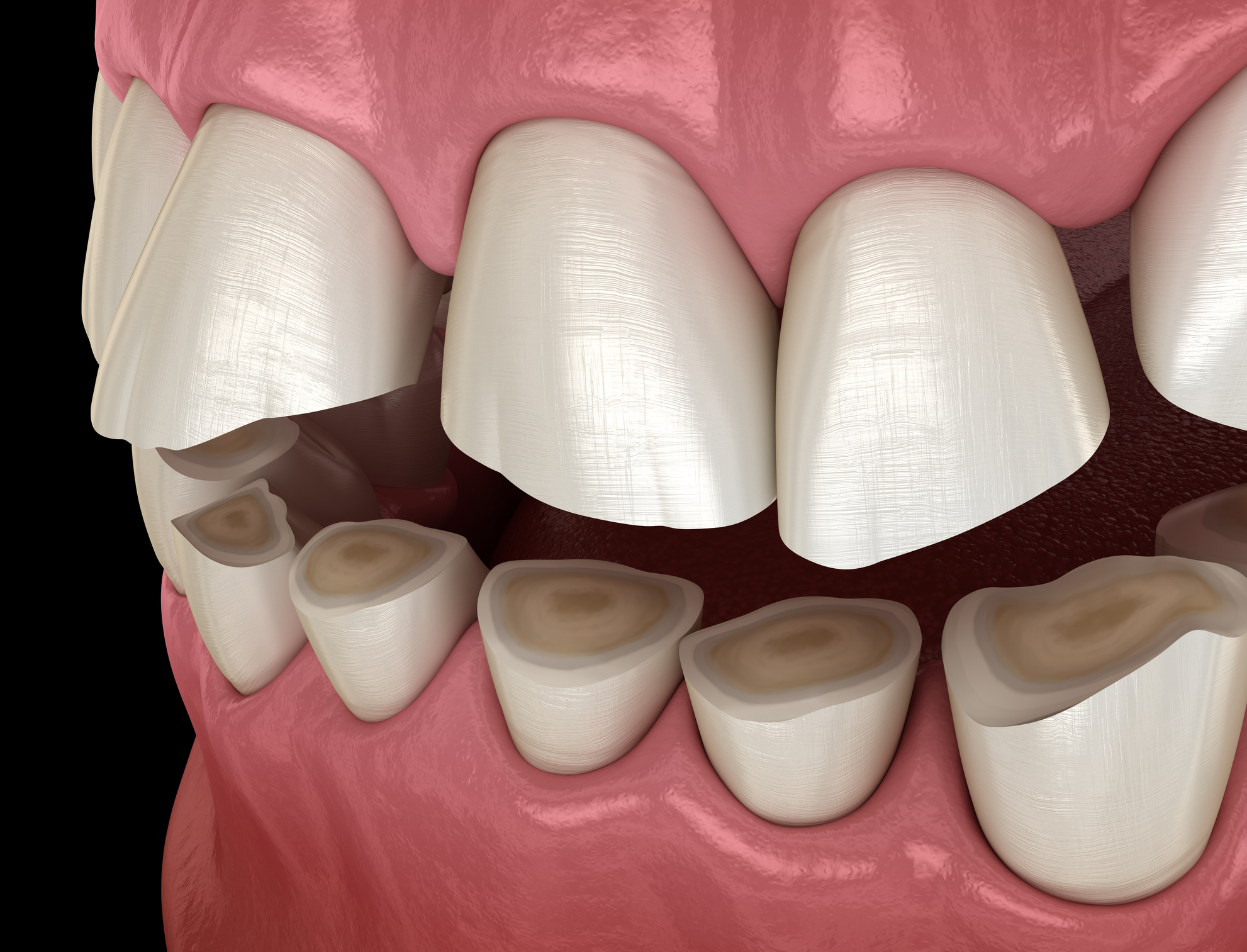
Effects of teeth grinding
Do you suffer from bruxism?
Do you grind your teeth? You might, without even knowing it. If you experience headaches, jaw pain, aching teeth, and throbbing temples, you may be grinding your teeth at night. Teeth grinding is a disorder known as bruxism, and it’s common, affecting as much as 30 percent of all people. Mild teeth grinding may not be a problem, but frequent or serious grinding can cause permanent mouth, jaw, or tooth damage if it’s not addressed. Here’s what you need to know.
The Dangers of Grinding Your Teeth
Tooth grinding can happen during waking or sleeping hours, and often, people don’t realize they’re doing it. Clenching your jaw without noticing or grinding and gnashing your teeth at night, though, can be damaging because the jaw can clamp down with 250 pounds of force. That much force can crack or break the teeth, as well as wearing down the enamel, and it can also cause chronic pain in the head, neck, and ears. Bruxism can lead to health problems like migraines, tinnitus, and sensitivity to noise, and some people even require a total joint replacement when the grinding gets so severe that it wears down the jaw cartilage.
Why Bruxism Happens
Sometimes, bruxism is a sign of stress. Clenching your muscles when you’re stressed, anxious, angry, or overwhelmed is a natural response, and if you are perpetually feeling those emotions, your clenched jaw can lead to nighttime tooth grinding. Certain medical conditions can lead to bruxism, like Huntington’s disease and Parkinson’s disease, and tooth grinding can also be the result of an existing sleep disorder. Sometimes, the medication you’re taking can cause you to grind your teeth. Antidepressants, antipsychotics, and amphetamines are all known causes of nighttime tooth grinding. If your teeth are misaligned, clenching and gnashing is even more likely to occur.
How do you know you’re doing it if you don’t know you’re doing it?
Your partner might be the first to notice, because bruxism can be noisy. Scraping, grinding, and clicking sounds can be loud enough to disrupt the sleep of a person sleeping in the same room as someone suffering from bruxism. Some people find they grind their teeth because of a dental visit. Grinding the teeth can wear them down, and sometimes the dentist is the first to notice. There are symptoms that you can catch, though, if you’re paying attention. Jaw pain and stiffness, tooth sensitivity, chipped or broken teeth, sore gums, clicking jaw joints, chronic headaches, earaches, or any evidence of excessive wear should prompt you to make an appointment with your dentist.
Preventing and Treating Bruxism
Your dentist is a powerful ally in the struggle with tooth grinding. Having a thorough dental exam can help you to determine the reasons you’re grinding your teeth, and your dentist can treat bruxism, sometimes with a measure as simple as a custom mouth guard you can wear while you’re sleeping. There are some steps you can take on your own, as well. Try employing stress reduction techniques, like deep breathing, mindfulness exercises, and yoga. Make sure your bedroom is your oasis, cool, dark, and quiet, with no TVs, computers, or phones. Try sleeping on your side or stomach, and work on daytime habits too, cutting back on caffeine and alcohol, avoiding chewing gum or biting on things that aren’t food, and establishing a relaxing bedtime routine. Physical therapy can help, especially through the use of massage, compresses, and mouth stretching exercises, and certain medications, like anti-inflammatory drugs or muscle relaxants, can be beneficial in treating bruxism.
Finding the Right Dentist
If you think your bruxism is causing issues, the first step towards fixing the problem is seeing a good dentist. If you’re looking for a dentist in New York, why not choose the dentist voted best in the city? At Park 56 Dental Group, we offer pediatric, prosthodontics, endodontics, oral surgery, Invisalign®, emergency, and sedation dentistry, all at the highest level of treatment. We serve the Midtown, Central Park, Upper East Side, Park Avenue, and all surrounding Manhattan and New York areas, with a patient-centered practice that has hours to fit your schedule. Schedule your complimentary consultation today by contacting us online or calling us at (212) 826-2322.
-
Understanding the Different Stages of Tooth Decay: From Early Signs to Advanced Damage
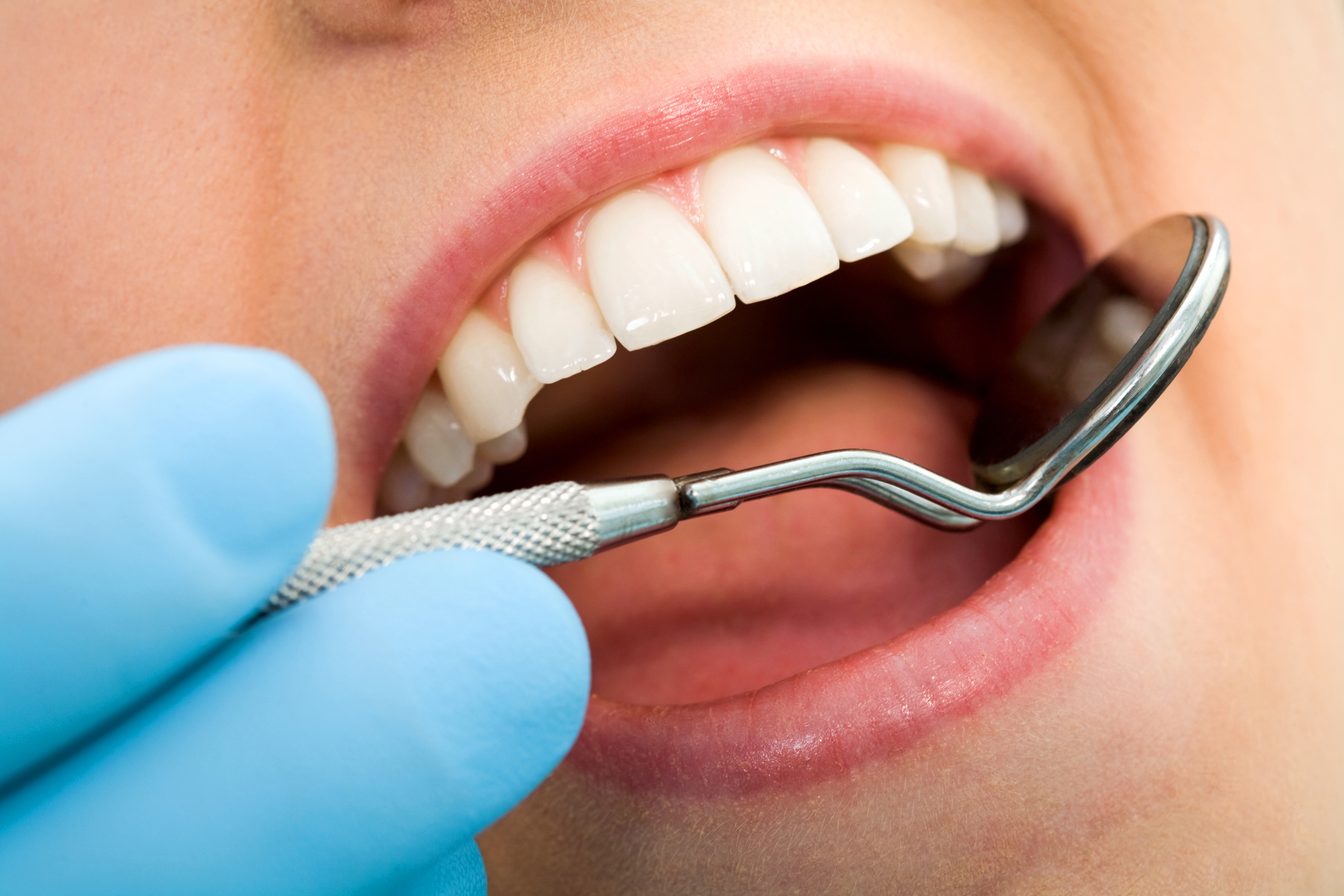
Checking for tooth decay
Understanding Tooth Decay
You know that your dentist looks for signs of tooth decay, and you probably know that good oral hygiene and a nutritious diet can help prevent it. What you may not know, however, is that tooth decay happens in five distinct stages. If you can catch it in the early stages, it can be reversed, so it pays to know what you’re looking for when you examine your teeth. Here, we discuss the five stages of tooth decay, from early signs to advanced damage.
The Five Stages of Tooth Decay
- Stage One- Demineralization: You might not realize it, but there are initial warning signs before a cavity develops. The outermost layer of your teeth is made of enamel, the hardest tissue in your body, which is made mostly of minerals. When the tooth is exposed to plaque, the acids caused by bacteria cause enamel to begin to lose minerals. This mineral loss can be seen as white, yellow, or brown spots on the teeth, which can easily be seen on the front teeth but are often missed on the molars.
- Stage Two- Enamel Decay: If the spots of demineralization go unnoticed or untreated, plaque buildup will begin to break down the enamel of the teeth. You might notice sensitivity, which is one of the first physical signs of damage. Weakened enamel can develop small holes known as cavities. This damage can’t be reversed, but a dentist can treat cavities with fillings, inlays, onlays, or crowns.
- Stage Three- Dentin Decay: Under the enamel is the dentin layer, with tissue that is much softer and more sensitive than enamel. As decay progresses, it can spread quickly along this layer, leading to tooth sensitivity and discoloration. Chewing food may become painful, and so can consuming hot or cold food or drinks.
- Stage Four- Pulp Infection: The innermost layer of the teeth is the pulp. This is the layer with the nerves and blood vessels that nourish the teeth and provide sensation. When pup is damaged, it can become inflamed and begin to swell, in a root canal infection. Root canal infections must be treated with endodontic therapy, removing the pulp, and capping the tooth, but if this isn’t an option, the tooth will need to be extracted.
- Stage Five- Abscess: This is the final stage of tooth decay, in which untreated decay spreads beyond the tooth. Bacteria invades the pulp and the surrounding tissues, causing an infection and a pocket of pus known as an abscess. The dentist will need to drain the pus carefully, after which the abscess can be treated with antibiotic and antiseptic medications.
What to Know About Kids and Tooth Decay
Children are more susceptible to tooth decay than adults, because the enamel of baby teeth is thinner than that of adults. In fact, according to the Centers for Disease Control and Prevention (CDC), tooth decay is among the most common childhood conditions in the United States. It might not seem like this is a particularly significant problem, since baby teeth eventually fall out, but it is very important to protect those little teeth. Children need their teeth for chewing and speaking, and baby teeth are the placeholders for adult teeth; losing them to decay can cause adult teeth to grow in incorrectly. To prevent childhood tooth decay, teach your children too brush their teeth thoroughly and limit sugary foods. Additionally, make sure your children have their first dental appointments by the time they turn one year old.
Preventing Tooth Decay
Good oral hygiene is the first line of defense against dental decay. Brush your teeth twice daily, floss regularly, and use mouthwash to reach the bacteria brushing and flossing can miss. Eating a nutritious diet and limiting sugar can help, and so can staying hydrated. See your dentist at least twice a year for checkups and cleanings, and so that the dentist can detect any early signs of decay. Talk to your dentist to find out if preventive measures like fluoride treatments and sealants are right for you.
Partner with Park 56 to Protect Your Teeth
If you’re looking for a dentist in New York, why not choose the dentist voted best in the city? At Park 56 Dental Group, we offer pediatric, prosthodontics, endodontics, oral surgery, Invisalign®, emergency, and sedation dentistry, all at the highest level of treatment. We serve the Midtown, Central Park, Upper East Side, Park Avenue, and all surrounding Manhattan and New York areas, with a patient-centered practice that has hours to fit your schedule. Schedule your complimentary consultation today by contacting us online or calling us at (212) 826-2322.
Park 56 Dental Group_1830990_Blog_August_2023_How to Choose the Right Toothpaste for Your Unique Dental Needs
Meta description: With so many toothpastes on the market, how do you know which to choose? Park 56 Dental Group offers tips on choosing the right toothpaste for you.
How hard can it be to choose a toothpaste?
How do you go about choosing a toothpaste? It seems like it should be easy! Once you get to the store, though, it’s easy to be overwhelmed by all the options. With so many toothpastes from which to choose, how do you pick the right one? Here, we offer some helpful tips for choosing the right toothpaste for your unique dental needs.
Know the Basics
Toothpastes contain abrasive agents, flavoring agents, detergents, humectants, and detergents, and are available in gel, paste, powder, or tablet forms. There are two important things to look for in a toothpaste: fluoride and the ADA seal of approval. Fluoride has been proven to protect against tooth decay and help to remineralize teeth, and the ADA (American Dental Association) must verify that a product is effective before that product can display the seal of approval.
Evaluate Your Dental Needs
Think about what you want a toothpaste to accomplish for you beyond just cleaning your teeth. Some common concerns include bad breath, sensitive teeth, plaque, gum disease, tartar, and yellowing teeth. Once you have assessed what you need, look for a toothpaste that fits with your concerns.
- Preventing cavities: Fluoride is a major factor in preventing cavities and strengthening enamel. Choose a toothpaste with mild abrasives, like hydrated silica or calcium carbonate, to remove plaque and surface stains without damaging enamel.
- Tartar control: Bacteria can cause biofilm on the teeth, and this can lead to plaque. When biofilm traps salivary calcium and phosphate, it crystallizes into tartar, also called calculus. While this is removed by the dental hygienist during your cleanings, it can be helpful to use a tartar control toothpaste in between visits. These toothpastes typically contain ingredients like zinc citrate and triclosan.
- Sensitivity: Dental pain is typically due to dentin hypersensitivity. Toothpastes with potassium and fluoride can help with sensitivity, as can toothpastes with strontium chloride, calcium carbonate, or arginine. Using desensitizing toothpaste for at least eight weeks can help reduce dental pain.
- Gum disease prevention: Toothpaste with ingredients that have antibacterial properties, like triclosan or stannous fluoride, can help prevent gum disease by reducing plaque and gum inflammation.
- Controlling bad breath: Brush your teeth for two to three minutes, at least twice a day, with a fluoride toothpaste. Brush your tongue from back to front, or use a tongue scraper. Baking soda can be effective for eliminating halitosis (bad breath), either in a baking soda toothpaste or on its own.
- Whitening teeth: There are several whitening toothpastes on the market, with bleaching ingredients like silica, pyrophosphates, and hydrogen peroxide. Hydrogen peroxide is a good option because it is gentle and won’t cause irritation in your mouth. If you do experience any uncomfortable symptoms, contact your dentist.
Choosing a Toothpaste for Children
Children over age six typically use adult toothpaste. Before that, as long as the toothpaste meets the fluoride and ADA seal requirements, you can choose a fun toothpaste for your children, to encourage them to brush frequently. Look for fun flavors, sparkles and swirls, or toothpaste in a container decorated with fun characters or superheroes. Make sure, though, that you teach children to spit out the toothpaste instead of swallowing it, because ingesting toothpaste can lead to chronic fluorosis for kids.
Partner with the Dentist Voted Best in New York
If you’re looking for a dentist in New York, why not choose the dentist voted best in the city? At Park 56 Dental Group, we offer pediatric, prosthodontics, endodontics, oral surgery, Invisalign®, emergency, and sedation dentistry, all at the highest level of treatment. We serve the Midtown, Central Park, Upper East Side, Park Avenue, and all surrounding Manhattan and New York areas, with a patient-centered practice that has hours to fit your schedule. Schedule your complimentary consultation today by contacting us online or calling us at (212) 826-2322.
-
Oral Hygiene Tips for Busy Professionals

Woman travelling
A Busy Schedule Can Get in the Way of Self-Care
When you’re a busy professional, keeping up with a hectic, fast-paced schedule, it’s easy to put self-care on the back burner. So many things demand your time and attention, whether you’re traveling or just living your life, that you may have trouble keeping up with things that are important to your health. One thing you should never neglect, though, no matter how busy life gets, is your oral health. Here, we offer some tips for busy professionals, to help you keep up with your oral hygiene.
Caring for Your Teeth at Home
Brush your teeth at least twice a day, for a minimum of two minutes each time. Using a soft-bristled brush with a small head and flexible neck, brush your teeth gently in a circular motion, with your brush at a 45 degree angle to the gum line. Start at the back of the mouth, working systematically and taking care to brush along the inner, outer, and chewing surfaces. Brush your tongue to remove bacteria from your mouth, and don’t forget to floss at least once a day. Wait for a few seconds after brushing to rinse so that fluoride has a chance to sit on your teeth. Limit in-between meal snacking, watch your sugar intake, and choose water over fruit juice or sweetened drinks.
Dental Care on the Go
Whether you’re traveling or just racing between appointments, prepare ahead of time to care for your teeth on a busy day. Carry a floss travel pack in your bag or wallet, and bring along some fresh, crunchy, fibrous vegetables like celery, carrots, and cucumbers. These foods have a high water content, which helps to balance the pH level of your mouth, and eating them helps scrape debris from your teeth in the middle of a hectic day when you don’t have time to brush. If you are traveling, clean the inside of your toiletries bag before packing your toothbrush, and let your toothbrush air dry whenever possible, to prevent the growth of microbes. Alternately, consider using disposable toothbrushes so that you know you always have a clean one. If you’re visiting a location where the water isn’t trustworthy, brush your teeth using bottled water.
Amping Up Your Efforts
If being pressed for time is a frequent problem for you, consider investing in an electric toothbrush. Electric toothbrushes have smaller heads, to get into tight spaces more easily, and the rotating brush effectively removes plaque from your teeth. Some can elan your teeth thoroughly in as little as 15 seconds, so that can shave a few minutes off of your daily routine. No matter which kind of toothbrush you use, replace it every two to three months, or immediately after you’ve been ill. If you find you need to replace your toothbrush more frequently than that, you may be applying too much pressure when you brush. Talk to your dentist about improving your technique so that you can keep your mouth clean without damaging your gums and tooth enamel.
Finding the Very Best Dentist
Perhaps the most important part of caring for your dental health is finding a dentist and keeping regular dental appointments to keep your mouth clean and catch any issues before they become serious- and time consuming. If you’re looking for a dentist in New York, why not choose the dentist voted best in the city? At Park 56 Dental Group, we offer pediatric, prosthodontics, endodontics, oral surgery, Invisalign®, emergency, and sedation dentistry, all at the highest level of treatment. We serve the Midtown, Central Park, Upper East Side, Park Avenue, and all surrounding Manhattan and New York areas, with a patient-centered practice that has hours to fit your schedule. Schedule your complimentary consultation today by contacting us online or calling us at (212) 826-2322.
-
How to Choose the Right Toothpaste for Your Unique Dental Needs
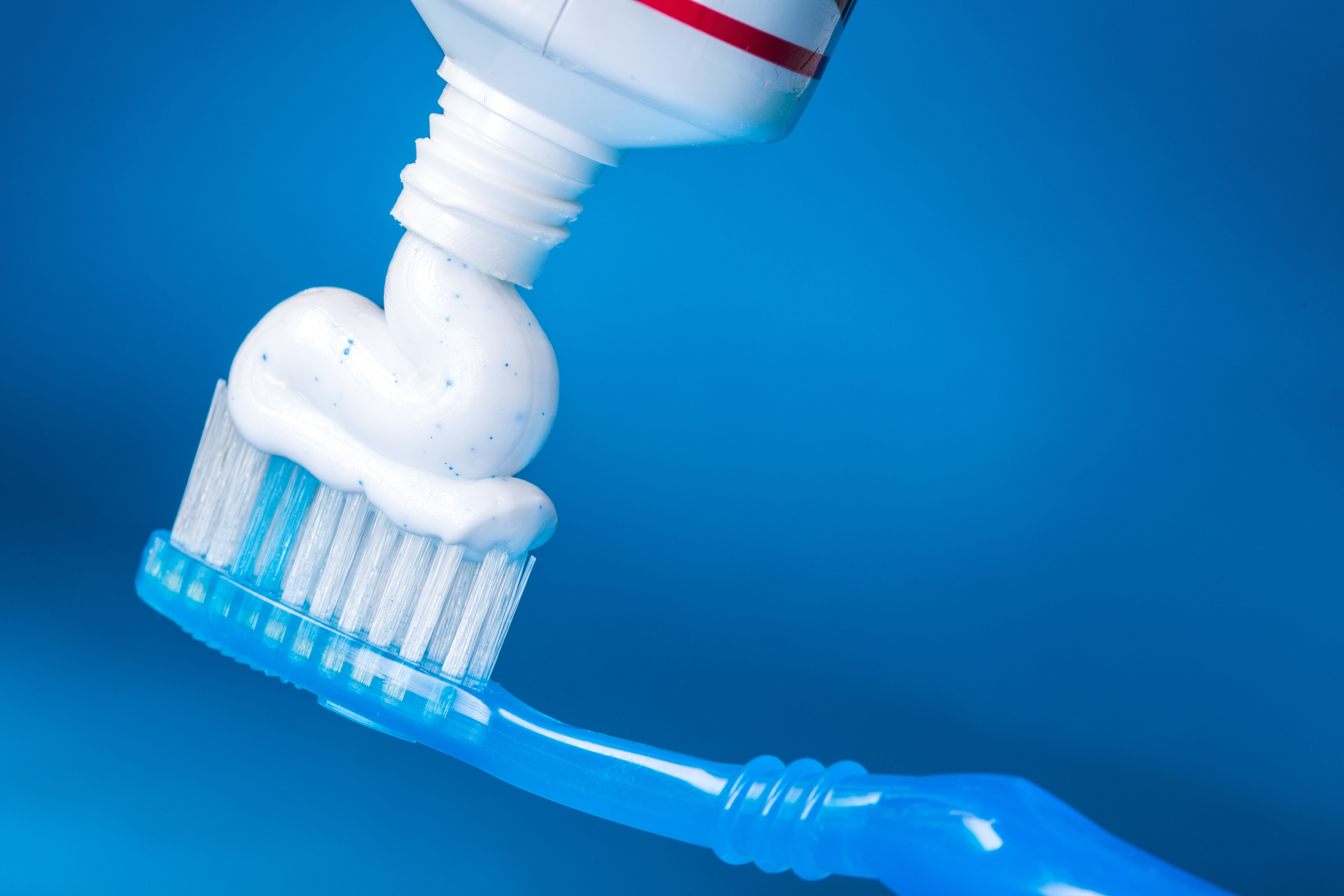
Picking the right toothpaste
How hard can it be to choose a toothpaste?
How do you go about choosing a toothpaste? It seems like it should be easy! Once you get to the store, though, it’s easy to be overwhelmed by all the options. With so many toothpastes from which to choose, how do you pick the right one? Here, we offer some helpful tips for choosing the right toothpaste for your unique dental needs.
Know the Basics
Toothpastes contain abrasive agents, flavoring agents, detergents, humectants, and detergents, and are available in gel, paste, powder, or tablet forms. There are two important things to look for in a toothpaste: fluoride and the ADA seal of approval. Fluoride has been proven to protect against tooth decay and help to remineralize teeth, and the ADA (American Dental Association) must verify that a product is effective before that product can display the seal of approval.
Evaluate Your Dental Needs
Think about what you want a toothpaste to accomplish for you beyond just cleaning your teeth. Some common concerns include bad breath, sensitive teeth, plaque, gum disease, tartar, and yellowing teeth. Once you have assessed what you need, look for a toothpaste that fits with your concerns.
- Preventing cavities: Fluoride is a major factor in preventing cavities and strengthening enamel. Choose a toothpaste with mild abrasives, like hydrated silica or calcium carbonate, to remove plaque and surface stains without damaging enamel.
- Tartar control: Bacteria can cause biofilm on the teeth, and this can lead to plaque. When biofilm traps salivary calcium and phosphate, it crystallizes into tartar, also called calculus. While this is removed by the dental hygienist during your cleanings, it can be helpful to use a tartar control toothpaste in between visits. These toothpastes typically contain ingredients like zinc citrate and triclosan.
- Sensitivity: Dental pain is typically due to dentin hypersensitivity. Toothpastes with potassium and fluoride can help with sensitivity, as can toothpastes with strontium chloride, calcium carbonate, or arginine. Using desensitizing toothpaste for at least eight weeks can help reduce dental pain.
- Gum disease prevention: Toothpaste with ingredients that have antibacterial properties, like triclosan or stannous fluoride, can help prevent gum disease by reducing plaque and gum inflammation.
- Controlling bad breath: Brush your teeth for two to three minutes, at least twice a day, with a fluoride toothpaste. Brush your tongue from back to front, or use a tongue scraper. Baking soda can be effective for eliminating halitosis (bad breath), either in a baking soda toothpaste or on its own.
- Whitening teeth: There are several whitening toothpastes on the market, with bleaching ingredients like silica, pyrophosphates, and hydrogen peroxide. Hydrogen peroxide is a good option because it is gentle and won’t cause irritation in your mouth. If you do experience any uncomfortable symptoms, contact your dentist.
Choosing a Toothpaste for Children
Children over age six typically use adult toothpaste. Before that, as long as the toothpaste meets the fluoride and ADA seal requirements, you can choose a fun toothpaste for your children, to encourage them to brush frequently. Look for fun flavors, sparkles and swirls, or toothpaste in a container decorated with fun characters or superheroes. Make sure, though, that you teach children to spit out the toothpaste instead of swallowing it, because ingesting toothpaste can lead to chronic fluorosis for kids.
Partner with the Dentist Voted Best in New York
If you’re looking for a dentist in New York, why not choose the dentist voted best in the city? At Park 56 Dental Group, we offer pediatric, prosthodontics, endodontics, oral surgery, Invisalign®, emergency, and sedation dentistry, all at the highest level of treatment. We serve the Midtown, Central Park, Upper East Side, Park Avenue, and all surrounding Manhattan and New York areas, with a patient-centered practice that has hours to fit your schedule. Schedule your complimentary consultation today by contacting us online or calling us at (212) 826-2322. For more dental advice, check out our other blogs!
-
Can Sports Drinks Rot Your Teeth?
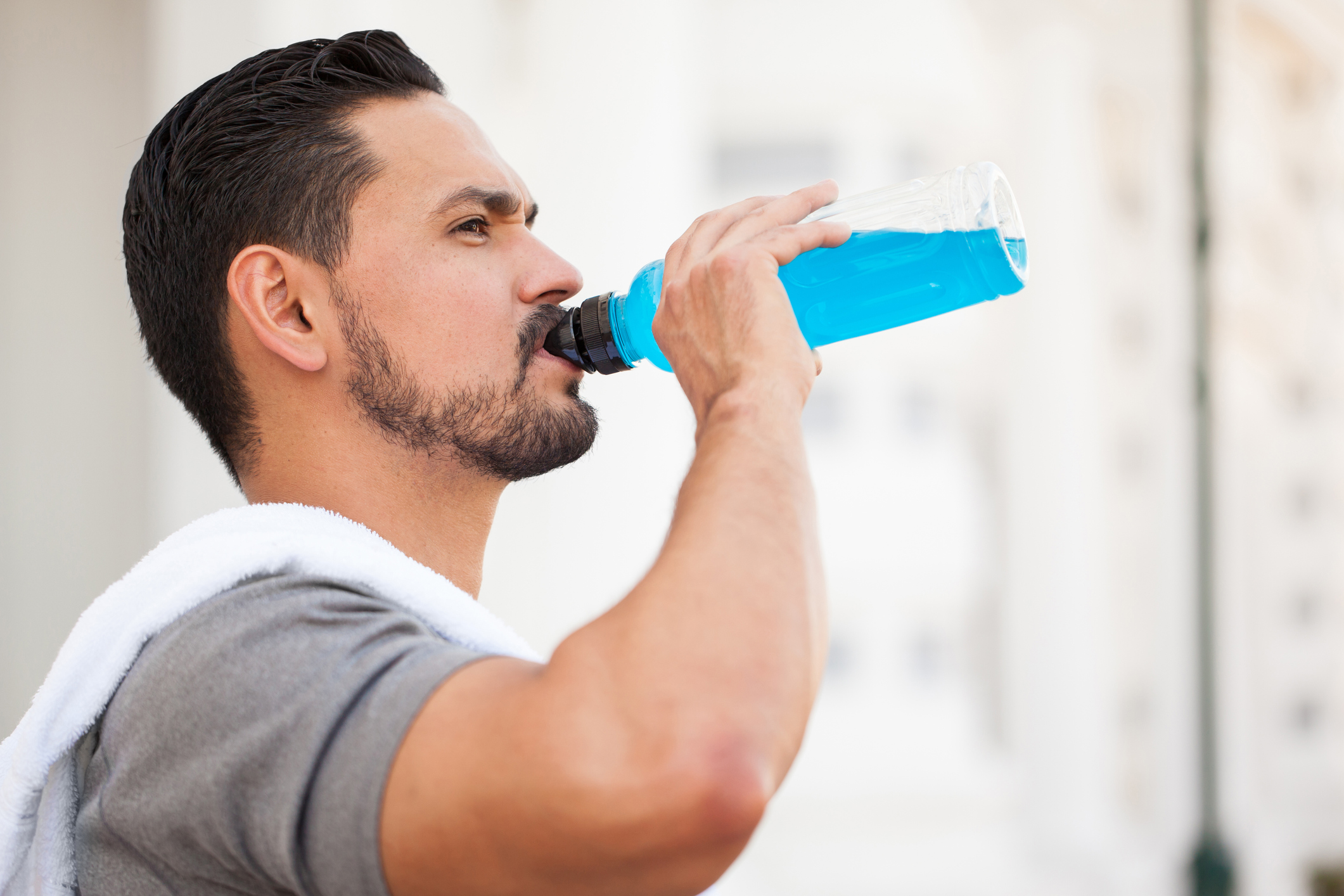
Man drinking sports drink.
A refreshing sports drink might feel like the perfect way to replenish your electrolytes after an intense workout, but have you considered the toll it takes on your oral health? A mounting body of evidence suggests that sports drinks contribute to dental problems, including tooth decay and erosion. Three problematic ingredients found in these beverages include citric acid, sugar, and artificial sweeteners.
The Problems with Citric Acid
Citric acid wreaks havoc on your teeth without your knowledge. As the name suggests, citric acid raises the acidity level in your mouth, compromising the outer layer of your teeth called the enamel. Once the enamel erodes, your teeth become more susceptible to stains and cavities. But that’s not all—citric acid is also known to cause gum inflammation, leading to more serious gum disease if not treated promptly.
The Not-So-Sweet Side of Sugar
Sugar is another common ingredient in sports drinks, which is notoriously linked to dental problems. Unfortunately, sugar feeds the harmful bacteria in your mouth. These bacteria feast on sugar, producing an acidic byproduct that eats away at your enamel. This process leads to cavities and, eventually, rotten teeth.
The Downsides of Artificial Sweeteners
Many sports drink manufacturers claim their products are healthier because they contain artificial sweeteners instead of sugar. While these sweeteners might not directly contribute to tooth decay as sugar does, they can still cause problems. In some people, artificial sweeteners can trigger tooth sensitivities and other dental problems, making them a less-than-ideal choice for good oral health.
Healthier Alternatives to Sports Drinks
Fortunately, quenching your thirst and replenishing your body post-workout doesn’t have to compromise dental health. Consider these viable alternatives:
- Plain water is the best way to hydrate without risking your dental health.
- Coconut water is an excellent natural source of electrolytes, making it a great way to hydrate and refresh without harmful additives.
- Homemade electrolyte drinks are easy to make. Simply mix water with a pinch of salt and a squeeze of lemon for a fast, effective electrolyte drink.
- Iced green tea is packed with antioxidants. Choose the unsweetened variety for a refreshing drink that’s good for your oral health.
- Water sweetened with fruit provides a natural and healthy flavor.
- Carbonated flavored water delivers fizzy satisfaction without added sugar and acid.
- Milk is a surprising source of natural electrolytes. Just avoid flavored or sweetened varieties containing added sugar.
Why Choose Park 56 Dental?
Good dental health requires regular check-ups and cleanings to catch issues early. This is where Park 56 Dental comes in. Our spa-like office caters to a clientele that appreciates personalized, quality dental care. With services ranging from general and cosmetic dentistry to sedation solutions and emergency dental care, we’re prepared to help you smile with confidence. We take pride in treating each patient individually and have been honored with the title of top New York dentist, serving the 10022 zip code since 1997.
Remember, good oral health isn’t just about picking the right drinks—it’s about having the right dental care provider by your side. Contact Park 56 Dental today at (212) 826-2322 for top-notch dental services in NYC.
-
Is Cosmetic Dentistry Right for You?

Happy patient after having cosmetic dentistry services.
It’s no secret that a captivating smile leaves a lasting impression. However, not everyone is born with perfect teeth. Cosmetic dentistry offers a solution for crooked, damaged, or not-so-pearly whites, allowing everyone to enjoy the benefits of an impeccable smile.
Why Do People Seek Out Cosmetic Dentistry?
Cosmetic dentistry provides a path to flawless teeth, improving your appearance and self-esteem. Still, people often seek cosmetic dentistry for more than just aesthetic purposes. By addressing a range of dental issues, cosmetic dentistry can enhance the functionality of your teeth, leading to improved oral health and overall well-being. You may want to seek out cosmetic dentistry if your teeth are:
- Misaligned
- Decayed
- Gapped
- Chipped or cracked
- Small or misshapen
- Stained or discolored
Cosmetic Dentistry Options
Numerous cosmetic dentistry procedures are available, depending on your unique needs:
- In-office Zoom! whitening is a popular option to instantly brighten your smile, effectively tackling discoloration in just three 15-minute applications within one hour.
- Tooth contouring reshapes teeth that don’t look quite right, which is perfect for making minor corrections.
- Bonding is when a tooth-colored material is bonded to a damaged tooth, filling in chips and cracks.
- Veneers are custom-made shells that cover the front of your teeth, perfect for tackling various cosmetic concerns, including gapped, chipped, stained, or misshapen teeth.
- Bridges replace missing teeth, bridging the gap and restoring your smile.
- Implants provide a permanent solution for replacing missing teeth, enhancing functionality and aesthetics.
- Metal-free fillings match your tooth color, fixing decay invisibly for a completely natural look.
- Complete smile makeovers take a comprehensive approach, combining various cosmetic procedures for a total transformation.
What You Should Know
Before embarking on your cosmetic dentistry journey, consider the following:
- Assessment: A thorough dental evaluation is the first step. Your dentist will help you identify the best cosmetic dentistry options for you.
- Timeline: Some procedures require multiple visits or recovery time, so plan accordingly.
- Cost and insurance: Cosmetic dentistry is an investment in your appearance and health, but not all procedures are covered by insurance. Discuss your options with your dentist and insurer.
- Expectations: Cosmetic dentistry can significantly improve your smile, but it’s essential to set realistic expectations.
- Maintenance: Regular check-ups, good oral hygiene, and a healthy lifestyle are recommended to extend the life of your cosmetic dentistry work.
Choosing a Cosmetic Dentist in NYC
Finding the right dental practice to perform your cosmetic procedure is critical to ensuring a pleasant experience and successful outcome. At Park 56 Dental, we know you expect personalized, quality dental care. That’s why we offer a relaxing, spa-like environment right in the heart of New York. We’ve been voted the top dentist in NYC, and with good reason. Specializing in general dentistry, prosthodontics, endodontics, sedation dentistry, and more allows us to focus on treating each patient’s individual needs.
Are you ready to enhance your smile? Contact us at (212) 826-2322 to schedule your cosmetic dentistry assessment. The smile you’ve always dreamed of is within reach!
-
Emergency Dental Care
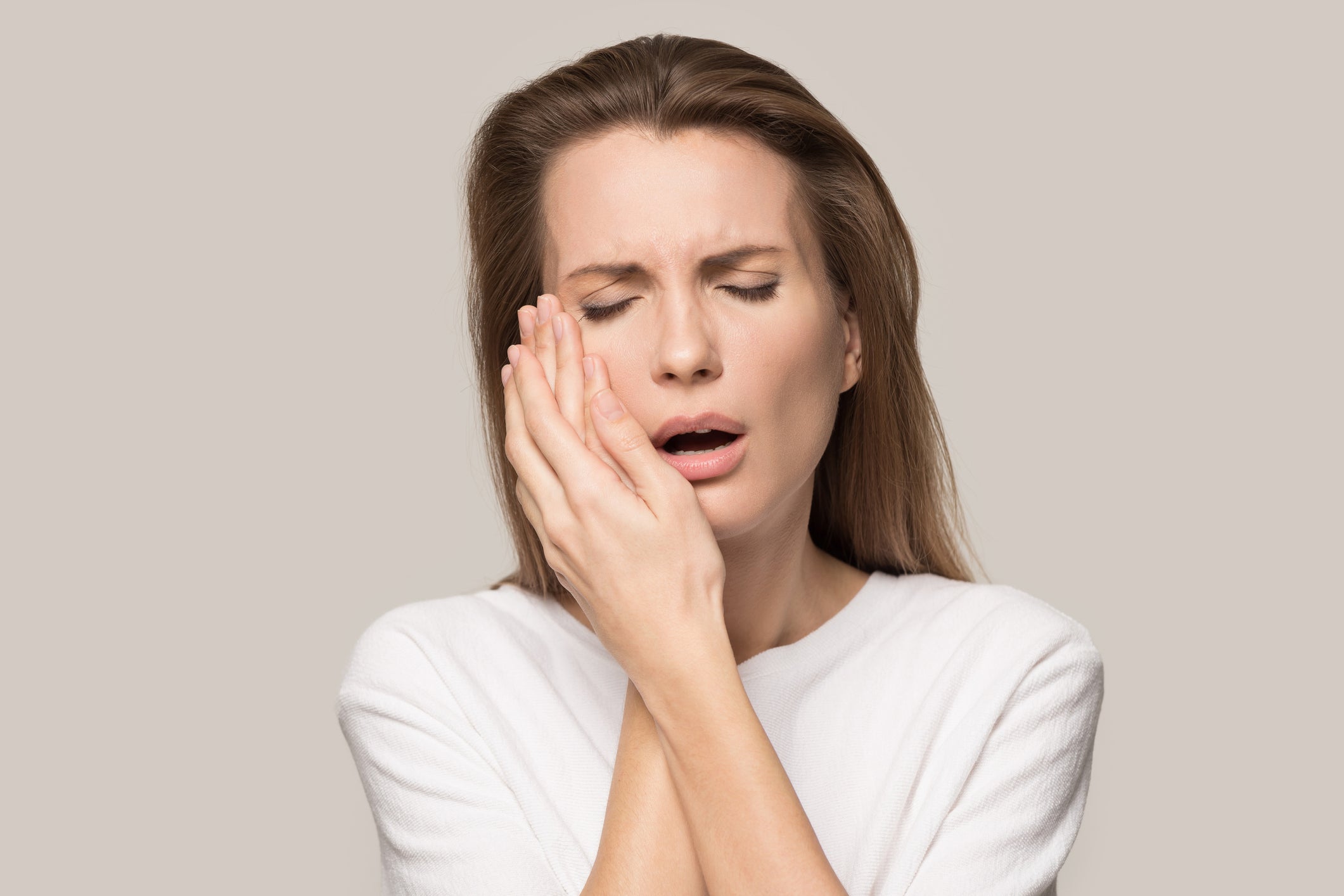
Woman Suffering From Dental Emergency
It’s natural to feel alarmed when you experience a toothache or get hit in the mouth. Is the pain a minor annoyance, or are you about to face a dental emergency? Understanding the difference between urgent and non-urgent dental scenarios helps you act quickly when necessary to maintain your radiant smile.
Deciding If it’s a Dental Emergency
Dental emergencies come in many forms. Some issues require immediate attention to alleviate pain and improve the chances of saving a damaged tooth. Watch for these symptoms of a dental emergency:
- Intense toothache
- Excessive bleeding
- Trauma to the face
- Loose or knocked-out tooth
- Broken or chipped tooth with a large chunk missing
Other issues aren’t a major cause for concern and can wait for a regular appointment. Examples of non-urgent situations include:
- Lost filling or crown
- Cracked tooth without pain or sharp fragments
- Mild toothache with no other symptoms
The Crucial First Response
If you determine you’re having a dental emergency, knowing how to respond is crucial. Follow these tips until you can get to an emergency dentist:
- Treating a toothache: Rinse your mouth with warm water and gently floss to remove trapped food. If the pain persists, take over-the-counter pain relievers. Then, book a dentist appointment to find out what’s wrong.
- Treating excessive bleeding: Rinse with a saltwater solution. Then, apply a clean, damp piece of gauze or a cool, used tea bag to the area. If bleeding continues after 15 to 20 minutes, seek medical help.
- Treating a loose tooth: A loose tooth in adults is not normal. Avoid wiggling it to prevent further damage, and contact your dentist for a professional evaluation.
- Treating a knocked-out tooth: Handle the tooth carefully. Avoid touching the root, rinse it with water if dirty, and try reinserting it into its socket. If that’s not possible, store the tooth in a container of milk or use a tooth preservation kit and go to the dentist immediately.
- Treating a broken, cracked, or chipped tooth: Rinse your mouth with warm water and apply a cold compress. Over-the-counter pain relievers minimize discomfort. Contact your dentist right away, even if there’s no pain, because the tooth may be damaged internally.
The Role of an Emergency Dentist
An emergency dentist handles urgent cases with the proper tools and training. From antibiotics for infections to quick dental procedures for saving a knocked-out tooth, these professionals provide immediate relief and ensure long-term oral health.
Park 56 Dental is your go-to provider for same-day emergency dental care. We have served patients in the 10022 zip code and surrounding areas since 1997. We even boast the title of NYC’s best dentist. Our office feels more like a spa, and we focus on giving personalized, quality dental care to each patient. Our team has experience with everything from general dentistry and sedation dentistry to oral surgery and endodontics.
The next time a dental emergency strikes, you can count on us! Call Park 56 Dental at (212) 826-2322, and we’ll help you get your oral health back on track.
-
Sedation Dentistry

Happy Patient Waking Up From Sedation Dentistry
Does the thought of visiting the dentist make your heart race and your palms sweat? If so, you’re not alone. Dental anxiety affects millions of people, causing them to avoid much-needed dental care. Fortunately, there’s a solution: sedation dentistry. Explore the benefits of sedation dentistry and how it can help you overcome your fears.
What is Sedation Dentistry?
Sedation dentistry involves using medication to help patients relax during dental procedures. It’s especially beneficial for people with dental phobia, sensitive gag reflexes, or low pain tolerance. You may be familiar with some of the sedation techniques used in dentistry, ranging from nitrous oxide (laughing gas) for mild relaxation to intravenous (IV) sedation for achieving deep unconsciousness. The chosen method depends on the patient’s needs and the complexity of the procedure.
Overcoming Dental Anxiety
Feeling anxious about the dentist is a significant barrier to receiving proper oral healthcare. The fear of needles, dental instruments, or the sounds and smells of a dentist’s office can be overwhelming for some. Sedation dentistry makes the experience calming and stress-free, allowing patients to receive needed treatment.
Pain Management
Dental procedures can be extremely uncomfortable for those with a low pain threshold, sensitive teeth and gums, or anesthetic resistance. Sedation dentistry minimizes discomfort during treatment, allowing the dentist to perform procedures more efficiently and with less strain on the patient.
Increased Efficiency for Complex Procedures
Certain dental care, such as wisdom teeth extractions or extensive restorative work, can be time-consuming and require multiple visits. With sedation dentistry, dentists can sometimes complete procedures in fewer appointments because patients are more relaxed and able to tolerate longer treatment sessions. This saves time and effort for both the patient and the dental team.
Gag Reflex Control
Some people have overly sensitive gag reflexes, making dental procedures like taking X-rays and impressions an uncomfortable and challenging affair. Sedation dentistry helps relax the gag reflex, enabling the dentist to perform necessary procedures without triggering discomfort or causing difficulties for the patient.
Improved Communication and Cooperation
Maintaining patient cooperation while receiving dental care is crucial for successful treatment. Patients with dental anxiety or developmental disabilities may struggle to communicate their needs or sit still during appointments. Sedation dentistry reduces anxiety and promotes relaxation to create a more cooperative environment, allowing the dental team to provide the best possible care.
Schedule a Sedation Dentistry Appointment in NYC
Sedation dentistry is a game-changer for anyone who struggles with dental anxiety. Park 56 Dental, located in the 10022 zip code of New York City, provides sedation solutions as part of our comprehensive dental services. We offer a wide range of treatments in addition to sedation dentistry, including general dentistry, smile restoration work, emergency dentistry, and more. Our experienced and caring team takes the time to treat each patient individually, ensuring that all their needs are met.
Don’t let dental anxiety prevent you from achieving optimal oral health. Contact Park 56 Dental today at (212) 826-2322 to schedule a consultation and discover how sedation dentistry can transform your dental experience.
RECENT POSTS
categories
- Uncategorized
- Cosmetic Dentistry
- Veneers
- Healthier Teeth
- Teeth Whitening
- Dental Health
- Video
- Dental Emergencies
- Invisalign
- Dental Implants
- Root Canal
- Sedation Dentistry
- Infographic
- Dental Crowns and Bridges
- Dental Anxiety
- Gum Disease
- COVID-19
- Bad Breath
- New York Dentist
- Cut out sugar
- General Dentistry
- Oral Health
- Oral Cancer
- Dry Mouth
- Gum Health
- Toothache
- Dental Sealants
- Cavities
